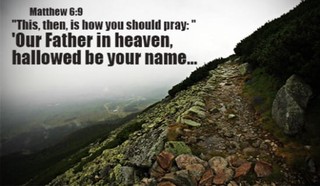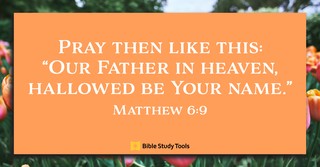- Recent Translations
- All Translations
Matthew 6:5
Share
Settings
Matthew 6:5 Meaning and Commentary
And when thou prayest, thou shalt not be as the hypocrites,
&c.] As the Scribes and Pharisees; whose posture in prayer, the places they chose to pray in, and the view they had therein, are particularly taken notice of:
for they love to pray standing in the synagogues, and in the corners
of the streets, that they may be seen of men.
It was their usual custom to pray "standing"; nay, it is established by their canons.
``There are eight things, (says Maimonides F21,) that a man that prays ought to take heed to do; and the first he mentions is "standing"; for, says he, no man may pray (dmyem ala) , "but standing"; if he is sitting in a ship, or in a cart, if he can stand, he must stand; if not, he may sit in his place and pray.''Several hints of this custom there are in the Misna F23.
``On their fast days they used to bring out the ark into the streets-- (hlptb wdme) , "and they stood in prayer", or praying; and caused an old man to go down before the ark, who was used to recite prayers, and he said them.''Again F24,
``whoever (hlptb dmwe) , "stood praying", and remembered that any uncleanness attended him, he might not break off, but he might shorten.''Yea, standing itself is interpreted of praying; for it is said F25,
``and Abraham rose up early in the morning to the place, where he stood, (hdymeb ala hlpt Nyaw) , "and there is no prayer but standing";''though sometimes they prayed sitting, as David did, ( 2 Samuel 7:18 ) so it is said of R. Jose, and R. Eleazar, that (yluw wbty) , "they sat and prayed", and afterwards rose up and went on their way F26. So it was likewise customary to go to the synagogues, and there pray; and indeed they were places built and appointed for this purpose.
``Wherever there were ten Israelites, a house ought to be provided, in which they may go to prayer at every time of prayer; and this place is called a synagogue F1.''Hence some have thought, that not such places are here designed, but any assembly, or concourse of people gathered together upon any occasion; but such an interpretation will find no place, when the following things are observed.
``For ever let a man go, morning and evening, to the synagogue; for no prayer is heard at any time, but in the synagogue; and everyone that hath a synagogue in his city, and does not pray in it with the congregation, is called a bad neighbour F2.''Again F3,
``he that prays in the house of the Lord, is as if he offered up a pure offering.''Now, partly on account of the publicness of the place, and partly because they thought their prayers were only heard there, therefore they chose to pray in the synagogues; and also in
the corners of the streets,
where two streets met, and they might be the more easily seen. This was also a common thing to pray in the streets:
``says R. Jochanan, I saw R. Jannai stand and pray in the streets of Tzippore F4.''And a little after, it is said of another, that he stood and prayed (ayjroab) , "in the streets"; though such places were not reckoned holy, as the synagogues were.
``The street of a city, (says Maimonides F5,) although the people pray in it at fasts and stations, because that there is a great collection of people, and the synagogues cannot hold them, has no holiness in it, because it is accidental, and not appointed for prayer.''Wherefore streets were only used in case of necessity, or by such of the Pharisees, who chose to be seen of men. A reason is given for this practice in another place F6, where it is asked,
``why do they go out to the streets, i.e. on their fast days? to show that we are reckoned as if we were carried captive before thee: says Joshua ben Levi, because they prayed in "secret", and were not answered; therefore they went without, (wmorptyw) , "that they might be made public".''Now let it be observed, that neither the posture, nor places of prayer, are condemned by our Lord, but their view in all to
be seen of men;
and a considerable emphasis lies upon the word "love"; they loved "standing" in prayer, rather than any other posture, because they could be better seen; and they loved to be in the synagogues and streets, rather than in their closets; they liked public better than private prayer, because it gained them applause among men.
Verily I say unto you, they have their reward;
they gain their point; they have what they seek for; and this is all they will have.
F21 Hilch. Tephilla. c. 5. sect. 1, 2.
F23 Misn. Taanith, c. 2. sect. 1, 2.
F24 Misn. Beracot, c. 3. sect. 5.
F25 Zohar in Lev. fol. 47. 1. T. Bab. Beracot, fol. 26. 2.
F26 Zohar in Exod. fol. 4. 4.
F1 Maimon. Hilch. Tephilla, c. 11. 1.
F2 lb. c. 8. sect. 1. T. Bab. Beracot, fol. 8. 1. & Piske Tosephot Beracot, c. 1. art. 7.
F3 T. Hieros. Beracot, fol. 8. 4.
F4 Ib. fol. 8. 3. & 9. 1.
F5 Hilch. Tephilla, c. 11. sect. 21. Vid. Maimon. & Bartenora in Misn. Megilla, c. 3. sect. 1.
F6 T. Hieros. Taaniot, fol. 65. 1.



